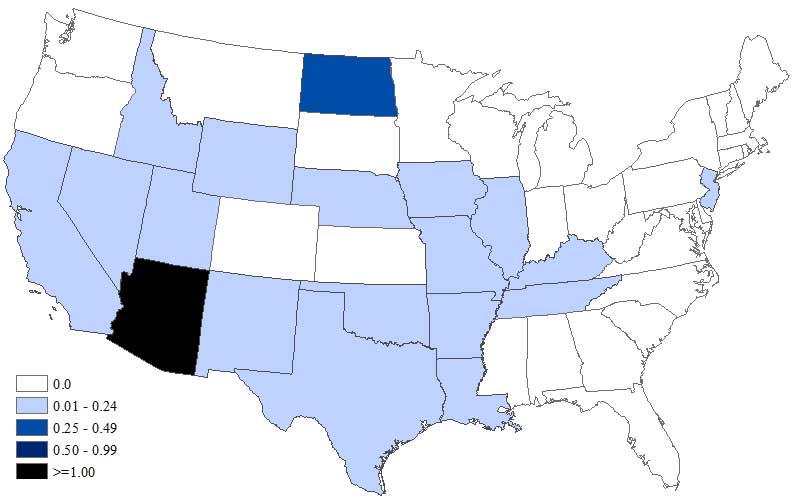Saturday, September 17, 2005
Print Article | Email Article
Heartbreak comes to horse-loving family
Bob Brownne
Tracy Press
Published on Saturday, September 17, 2005, in the Tracy Press.
The heartbreak of West Nile Virus hit a Banta family earlier this month.
Nancy Barney said that “Rusty,” who died on Sept. 5, had been with the family for only a couple of years after her sister, Valerie Rhoden of Castro Valley, saw him living the easy life in a pasture and bought him.
Barney’s husband, Gary, saw that Rusty had the personality and experience of a talented rodeo horse. Gary began to take Rusty to events, including an American Cowboy Team Roping Association tournament in Reno last October, where they learned a little bit more about Rusty’s history.
“This guy says, ‘Where’d you get this horse?’” Nancy Barney recalls. “He said (Rusty) had won a lot of money in Texas where he was born and bred.”
It turned out the inquisitive man was Rusty Rice of Terrell, Texas, a national director of the roping association and a well-known horse rancher. He was the one who raised Rusty and gave him his distinctive double-R brand.
“And he remembered this horse after 16 years,” Barney said.
She isn’t certain about Rusty’s age, but figures he was 18 to 20 years old, which is old enough to retire from most rodeo competition but not too old to stay on the job.
Barney said he fit right in at her job, which is to chase down exuberant racehorses at Golden Gate Fields in Albany when they stray from the track.
“My horse I usually ride was lame so I took him in,” she said.
Rusty was on the job for about a month. “He did the job and he did it well,” Barney said.
But it was on one of these trips to the racetrack that they saw Rusty was ill. Barney said Rusty appeared to trip and fall, his back legs going under the back of the travel trailer, as he stepped into the trailer, then fell again coming out of the trailer when they got to the track.
They called in some veterinarians, who said Rusty could have pulled some leg muscles or was just tired. But there were a couple more falls, and by the fourth day, his condition was worse. Barney said a veterinarian who works with racehorses finally delivered the bad news.
“The horse was so dramatically different than the day before and he said his chances for recovery were slim,” she said.
Rusty was euthanized on Sept. 5 and through the racetrack Barney was able to get an autopsy done. Tests confirmed that he had a severe case of West Nile virus.
Barney said she and her family are especially sad because they knew Rusty and the family’s half-dozen other horses were vulnerable to the disease and they tried to prevent it. The disease is spread by mosquitoes, which pass it along to birds, horses and people.
Barney had seen the dead birds around Banta and had made sure all of their horses were vaccinated. Rusty, though, still hadn’t received a booster shot that would have improved his immunity.
Gregory Ferraro, director of the Center for Equine Health at UC Davis, said what happened to Rusty is typical of horses that come down with severe cases of West Nile virus.
“The older horses are more susceptible to the more severe forms,” Ferraro said.
Even with vaccines, it takes several weeks for an older horse to build up immunity, he added.
Symptoms in horses can range from mild muscle tremors to the inability to stand up. He said about 40 percent of the horses that get sick in California have died, and of those that recover, as many as one in five could relapse and die later on.
“There are many more horses that get bitten, get the disease and throw it off with their own immune systems,” Ferraro said.
“For every (infected) horse that shows clinical symptoms, there are probably four that don’t.”
To reach reporter Bob Brownne call 830-4227 or e-mail brownne@tracypress.com.


No comments:
Post a Comment